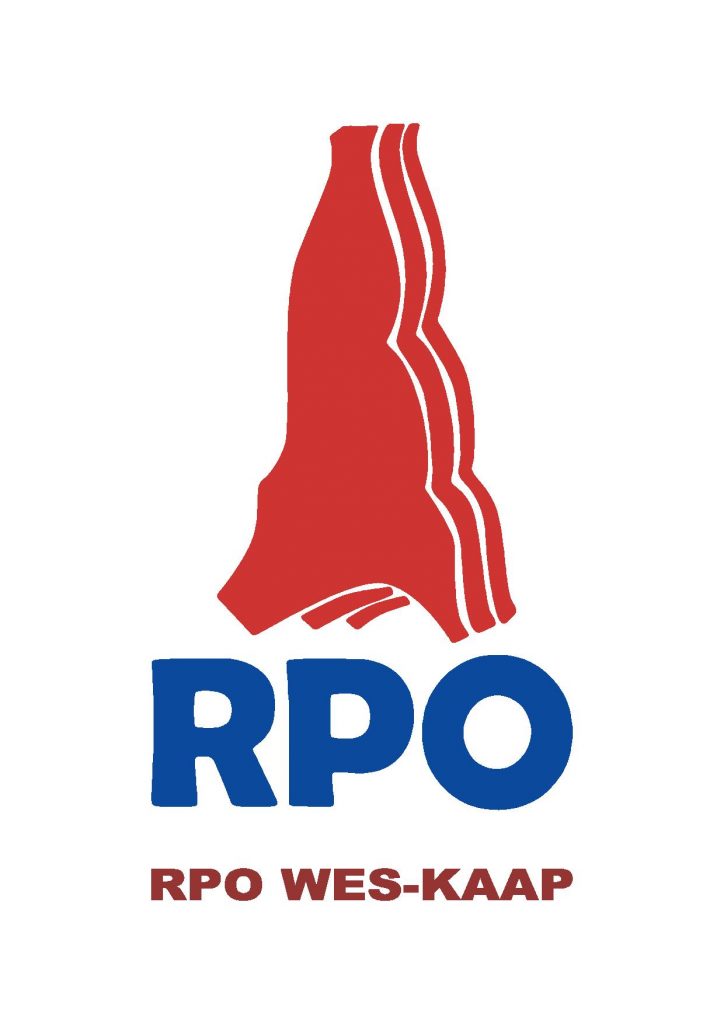RPO WESTERN CAPE
The RPO is constantly striving for the interests of commercial red meat producers within the value chain of the red meat industry to protect and promote.
RPO Western Cape
Who Is RPO?
The RPO constantly strives to protect and promote the interests of commercial red meat producers within the value chain of the red meat industry. The RPO also wants to improve the economic prosperity of its producers as a collective bargaining organization. The RPO focuses on important operational tasks
The RPO’s participation in and participation in structures
The RPO has direct liaison, representation and participation in, among others, the following institutions to protect and promote the interests of red meat producers:
- National Agricultural Marketing Council;
- National Agricultural Research Forum;
- Onderstepoort Biological Products (EMP);
- Onderstepoort Veterinary Institute (OVI);
- Game Industry South Africa (WRSA);
- National and provincial stock theft forums;
- Organized agriculture organizations;
- Agri SA Chamber of Commerce;
- Operational trusts;
- Livestock Producers Organization of Namibia;
- Predation Management Forum;
- Racial Societies;
- National and provincial government departments;
- Training and research institutions;
- Coordinating Committee for Livestock Welfare;
- Red Meat Research and Development SA;
- Other producer organizations;
- Mutton SA;
- International industry organizations.
The RPO represents the interests of red meat producers in the Meat Industry Forum, which represents all institutions involved in the full value chain of the red meat industry. The forum is composed of:
- South African Pork Producers’ Organization;
- Red Meat Abattoir Association;
- South African Feedlot Association;
- South African Federation of Livestock and Meat Brokers;
- National Federation of Meat Traders;
- South African Meat Processors;
- South African National Consumer Union Association of Meat Importers and Exporters;
- Council for Skins, Leather and Skins (SHALC);
- National Emerging Red Meat Producers Organization (NERPO);
- yy South African Meat Distributors and Allied Workers ’Union;
- RPO Livestock;
- RPO Small Stock.
The RPO, together with Nerpo, forms the Federation of Red Meat Producers’ Organization of South Africa, which deals with the collective interests of primary commercial and emerging red meat producers.
Why charge voluntary contributions?
Critically important functions for the survival and prosperity of primary red meat producers and the red meat industry as a whole are funded from two separate sources of funding: the statutory levy and the voluntary producer contribution.
The statutory levy is introduced within the framework of the National Agricultural Marketing Act and is used exclusively for the following functions in importance of the industry:
- Consumer security (food safety);
- Consumer communication and education;
- Research and development;
- Industry Liaison;
- Emerging sector development
- Production development and operational projects;
In terms of the provisions of the National Marketing Act, an organization such as the RPO may not fund any organizational functions from the statutory levy.
The primary producer makes the largest contribution to the statutory levy and if the producer does not financially empower the RPO in its monitoring task, the paying producer will lose its say over the scope and use of these statutory funds. It is imperative that the RPO, on behalf of the producer, have a strong say in the Meat Industry Forum to ensure that statutory funds are managed correctly.
The amount for the voluntary levy currently demanded from producers is 0.15% of turnover at the first point of trading. Several critically important actions that the RPO undertakes in the interest of livestock producers will not be able to exist without the voluntary contributions due to a lack of capacity.
Agents and abattoirs charge the voluntary contributions within the provinces and pay them over to the RPOs within each province. They then pay a predetermined amount to the national RPO with which he performs his organizational and administrative functions. According to the rule of thumb, 70% of the funds are used within the provinces and 30% for national actions.
As a primary stakeholder in the red meat industry, producers are expected to make a financial contribution by supporting both the statutory and voluntary contributions. It creates capacity to address and secure producer interests within the overall value chain of the industry.
Organizational and administrative functions
Functions financed in the interest of the producer from the voluntary levy:
- Provincial and national office and staff;
- Administrative management of national office and provinces;
- Radio and TV interviews;
- Red meat marketing at local level;
- Producer liaison through information days, conferences, text messages, website information, brochures, the Communicator, Facebook, the Red Meat magazine and an electronic newsletter;
- Policy influence at the provincial and national governments;
- Liaison with departments and veterinary services on issues such as border and disease control;
- Training of producers and their workers;
- Funding of relevant research projects;
- The operation of the National and Provincial Livestock Theft Forums;
- Consumer Liaison
EXPLANATION OF STATUTORY LEVY
CATTLE
- R4.26 per head is recovered from the seller and paid over to the buyer in all transactions.
- R7,10 per head is paid at the point of slaughter by the person offering the animal for slaughter and the same applies to imports of cattle.
SHEEP AND GOATS
- R0.90 per head is recovered from the seller and paid over to the buyer in all transactions.
- R1.38 per head is paid at the point of slaughter by the person offering the animal for slaughter and the same applies to imports of small stock.
IMPORTS A
- permit for the import of meat amounts to R792 per permit, with a maximum of 28 tons per permit.
SKIN AND SKIN
- Hides and skins are charged at 1.37 cents per kilogram
AGENTS
- Livestock agents pay 0.07% of their commission.
TRADE
- Outlets pay R450 per year. The industry will have to reconsider the continuation of the statutory levy after 2014
